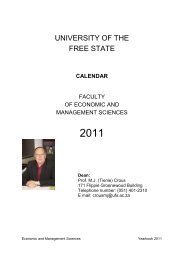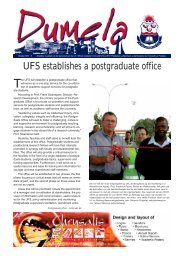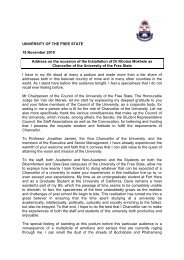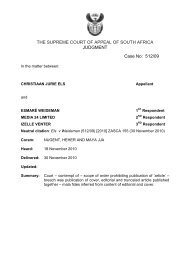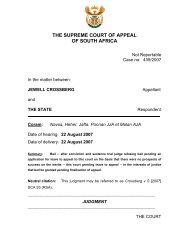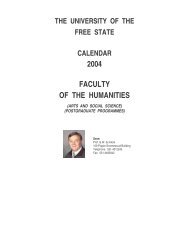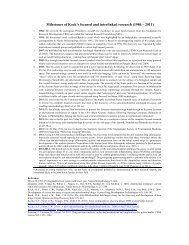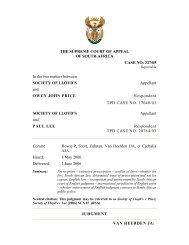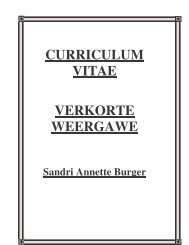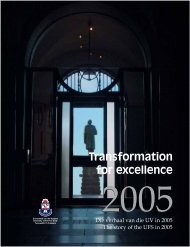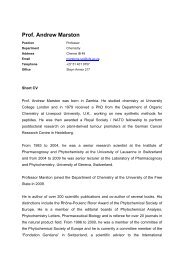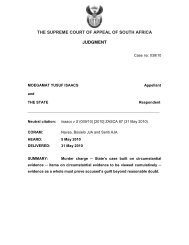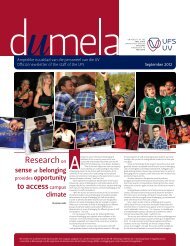You also want an ePaper? Increase the reach of your titles
YUMPU automatically turns print PDFs into web optimized ePapers that Google loves.
Personeel<br />
Johan Meyer praises<br />
<strong>the</strong> beauty <strong>of</strong> maths<br />
By Margaret Linström<br />
The commitment <strong>of</strong> Pr<strong>of</strong>. Johan Meyer <strong>of</strong> our<br />
Department <strong>of</strong> Ma<strong>the</strong>matics and Applied<br />
Ma<strong>the</strong>matics to his subject is plain to see,<br />
but it’s when he speaks about “<strong>the</strong> beauty<br />
<strong>of</strong> a ma<strong>the</strong>matical problem” that you realise<br />
that it’s more than mere commitment, this is<br />
passion speaking.<br />
This passion he lives out by devoting much <strong>of</strong> his<br />
free time to <strong>the</strong> drawing up <strong>of</strong> question papers for<br />
ma<strong>the</strong>matical olympiads and to <strong>the</strong> training <strong>of</strong> learners<br />
in preparation for <strong>the</strong>se events. He says that <strong>the</strong> work<br />
he does for <strong>the</strong> various olympiads is “almost like a<br />
hobby. I see <strong>the</strong> olympiads as a type <strong>of</strong> community<br />
involvement. I do it for <strong>the</strong> love <strong>of</strong> <strong>the</strong> subject and for<br />
<strong>the</strong> promotion <strong>of</strong> ma<strong>the</strong>matics. Right through your life<br />
you collect ma<strong>the</strong>matical problems, and you jot <strong>the</strong>m<br />
down. Then for <strong>the</strong> olympiads everybody brings <strong>the</strong>ir<br />
stash <strong>of</strong> problems. We discuss <strong>the</strong>m, and try to solve<br />
<strong>the</strong>m. That is part <strong>of</strong> why I do it.”<br />
Pr<strong>of</strong>. Meyer is involved in ma<strong>the</strong>matical olympiads from<br />
<strong>the</strong> highest level right down to provincial level. Right<br />
at <strong>the</strong> top <strong>of</strong> <strong>the</strong> pile is <strong>the</strong> International Ma<strong>the</strong>matical<br />
Olympiad (IMO), for which he is <strong>the</strong> South African<br />
representative. The IMO is <strong>the</strong> world championship for<br />
high school learners and it is held in a different country<br />
every year. The first IMO was held in Romania in 1959,<br />
with only seven countries participating, and since <strong>the</strong>n it<br />
has grown to over 90 countries on five continents.<br />
Pr<strong>of</strong>. Meyer explains that “learners, who have been<br />
chosen to take part in <strong>the</strong> IMO, have to undergo intense<br />
training beforehand as <strong>the</strong> ma<strong>the</strong>matical problems,<br />
which need to be solved at that level, are extremely<br />
difficult”.<br />
Ano<strong>the</strong>r olympiad which Pr<strong>of</strong>. Meyer devotes time and<br />
energy to is <strong>the</strong> Pan African Ma<strong>the</strong>matics Olympiad<br />
(PAMO). PAMO is held in a different African country<br />
once a year, and this year Pretoria will host it. Pr<strong>of</strong>.<br />
Meyer’s involvement in PAMO is on <strong>the</strong> Problems’<br />
Committee, and he is primarily involved with <strong>the</strong><br />
drawing up and moderating <strong>of</strong> question papers.<br />
The South African Ma<strong>the</strong>matics Olympiad (SAMO)<br />
also utilizes Pr<strong>of</strong>. Meyer’s vast expertise. This premier<br />
ma<strong>the</strong>matics competition is almost as old as <strong>the</strong><br />
International Ma<strong>the</strong>matical Olympiad. It is a three<br />
round competition which is presented at both junior<br />
and senior level. The first round attracts some 50 000<br />
entries from all over <strong>the</strong> country. The paper consists <strong>of</strong><br />
multiple-choice questions, and ma<strong>the</strong>matics teachers<br />
at <strong>the</strong> different schools mark <strong>the</strong> papers <strong>the</strong>mselves.<br />
Learners need to get 50% to progress to <strong>the</strong> second<br />
round, and only 100 are selected for <strong>the</strong> third round.<br />
It’s for this third round which Pr<strong>of</strong>. Meyer serves on <strong>the</strong><br />
committee which sets up <strong>the</strong> senior question paper.<br />
The ten best achievers win medals and according to<br />
Pr<strong>of</strong>. Meyer <strong>the</strong> prize-giving ceremony is “a big event” for<br />
those who make <strong>the</strong> final grade.<br />
At provincial level <strong>the</strong>re are o<strong>the</strong>r ma<strong>the</strong>matics<br />
competitions, which <strong>the</strong> pr<strong>of</strong>essor says is “like <strong>the</strong> Currie<br />
Cup between <strong>the</strong> provinces”. There are 16 regions<br />
countrywide, and <strong>the</strong> <strong>Free</strong> <strong>State</strong> has been showing its<br />
mettle at junior and senior level because <strong>of</strong> <strong>the</strong> excellent<br />
training programmes available to learners. One <strong>of</strong> <strong>the</strong>se<br />
programmes with which Pr<strong>of</strong>. Meyer is actively involved<br />
is <strong>the</strong> Nautilus Ma<strong>the</strong>matics Project, an initiative which he<br />
describes as exciting.<br />
Learners are taught techniques and problem solving at<br />
<strong>the</strong> Nautilus workshops which are held four times a year.<br />
Pr<strong>of</strong>. Meyer’s involvement is with <strong>the</strong> Grade 11 and 12<br />
learners.<br />
But is ma<strong>the</strong>matics a subject where you ever know<br />
it all? Pr<strong>of</strong>. Meyer smiles when he answers that “a<br />
ma<strong>the</strong>matician never stops learning. The more you know,<br />
<strong>the</strong> more <strong>the</strong>re is you do not know. It’s like a circle with<br />
an outer edge – <strong>the</strong> bigger <strong>the</strong> circle, <strong>the</strong> bigger <strong>the</strong> outer<br />
edge, and <strong>the</strong> edge is what you don’t know. That makes<br />
it so exciting – to continually make new discoveries.”<br />
Pr<strong>of</strong>. Johan Meyer.<br />
50 <strong>Bult</strong> 51<br />
Photo: Hannes Pieterse



